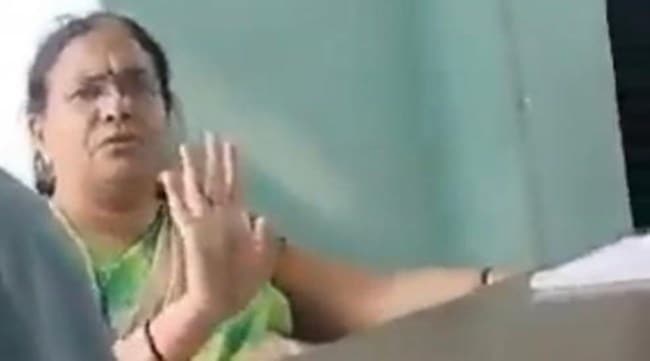Opinion Winning the Moon, but losing a twinkling star in Muzaffarnagar
Before it becomes difficult to meet the eyes of other little stars, before their dreams are crushed under the burden of hate, the nation builders must rise
 Taking suo motu cognizance of the issue based on the video, the NCPCR has said that the “minor student has been seen subjected to physical and mental harassment in a school situated in district Muzaffarnagar.’’
Taking suo motu cognizance of the issue based on the video, the NCPCR has said that the “minor student has been seen subjected to physical and mental harassment in a school situated in district Muzaffarnagar.’’ “A teacher affects eternity; you can never tell where his influence stops.”
This quote by Henry Adams, a 19th century American historian and academician, encapsulates how great an impact a teacher can make in our lives. The one who can change the way we see the world, who was the only hope for a smile on an otherwise dull day at school, who would stand as a shield against bullies, who would encourage you to go and speak on stage even if you stammer or for whom you would paint the prettiest Teacher’s Day greeting card, putting in it your heart and soul.
Indeed, for the child at a school in Muzaffarnagar too, who was humiliated and slapped multiple times by his classmates on the orders of his teacher Tripta Tyagi, who also referred to his religion in the class as ‘Mohammedan’, the influence and actions of this teacher would “affect eternity”, the scars of being beaten would stay in his heart and mind for long, his confidence might be crushed for years to come — and the echoes of her words might haunt him forever.
Around 48 hours before the incident came to light, we had won the Moon. The success of Chandrayaan-3 felt personal, our own, our pride. But hours later, when the celebrations were still on for the exceptional feat over the distant Moon, a little star, in our very own home, was lost. The wailing face of the child, slapped and abused, started reflecting in every Chandrayaan-3 video I saw on social media and suddenly, along with the little star, the Moon too, for me, was lost.
In his speech while addressing scientists at ISRO, applauding Chandrayaan-3’s success, Prime Minister Narendra Modi said that the “name of Chandrayaan was resonating among children in the country, each child was now seeing his/her future is this success” and their “eyes were filled immense hope for bright future”, but does that also hold true for the boy whose twinkling eyes were filled with tears of humiliation?
In India, classrooms and schools have been the messengers of teaching children about the country’s core value of “unity in diversity”. It wasn’t very long ago when, in the early 2000s, the Centre’s Sarva Shiksha Abhiyan (Education For All) campaign “School Chalein Hum” (Let’s go to school), spearheaded by then Prime Minister Atal Bihari Vajpayee, had painted the most heartwarming picture of country’s diversity on television screens in almost every household, the bright, smiling faces of children coming from diverse states and backgrounds. From the deserts of Rajasthan to the lush green hills of the Northeast, from the snowy peaks of Jammu & Kashmir to the plains of Punjab and Uttar Pradesh — dressed in suits, skirts, salwar kameez, shirts and even hijab — smiling children rushed to school, traveling by boat, camel and bicycle and on foot. The campaign song, which soon became an education anthem, also featured then President A P J Abdul Kalam encouraging children to go to school.
Muzaffarnagar school video is a painful warning of how deep rooted religious divides can trigger violence against the marginalised, minority communities. Our MLAs from Muzzafarnagar will ensure that UP Police files a case suomoto & the child’s education is not disrupted!
— Jayant Singh (@jayantrld) August 25, 2023
The minds of children are not wired to see their peers through the prism of religion. In the past, Indian cinema has been a true reflection of how schools not only served as temples of knowledge for children but also as a second home where the teacher protected their innocence, keeping caste and religion miles away from classrooms. It isn’t surprising that legendary poet-lyricist Sahir Ludhianvi’s words for the 1968 film Do Kaliyan still remain in people’s hearts to explain why children are wiser than adults: “Bachhe mann ke sachhe… inme chhoot aur chhaat nahi… jhoothi jaat aur paat nahi.. bhaasha ki taqraar nahi.. mazhab ki deewar nahi.. inki nazron mein ikk hai mandir masjid gurdware…”
The hope, though, never dies. Covering school education in Punjab took me to some such “schools of hope”, not hate, where teachers like Amarjit Singh Chahal and Lavjit Singh Grewal, have been teaching their children to respect and thank their mid-day meal cook “aunties”, all from the Dalit (SC) community. Some schools in Punjab, which have children from several communities including Dalit and Muslim, have developed a tradition of “thanking” their sweepers, midday meal cooks and other class-IV staffers. At Chahal’s government primary school in Rali village of Mansa, considered a “backward” district, the SC community cooks are called on stage along with other dignitaries during special programmes.
One can’t ignore how a 1959 track by Sahir Ludhianvi has started resurfacing on social media in 2023, with several in the country wondering if the country is actually on a downslide, going from a progressive to regressive society. The song from the 1959 film Didi starred Sunil Dutt as a teacher who is asked by his students the question of how a diverse country can be unified too: “Humne suna tha ek hai Bharat, sab mulkon se nek hai Bharat… lekin jab nazdeek se dekha, humne nakshey aur hi paaye… ek se ek ki baat juda hai, dharam juda hai jaat juda hai..aapne jo kuch humko padhaya, wo to kahin bhi nazar na aaya…”
And the teacher replies: “Jo kuch maine tumko padhaya, usme kuch bhi jhooth nahi… bhasha se bhasha na mile to, iska matlab foot nahi… ikk daali par rehkar jaise phool juda hai paat juda, bura nahi gar yun hi watan mein dharam juda ho jaat juda…”
In current times, when children have wide access to smartphones and the internet, it would be wishful thinking to assume that the impact of the Muzaffarnagar incident would be limited to children exposed to brazen communalism. The fact that a child was identified in a classroom by a teacher who brazenly referred to his religion for whatever reason should be the last straw to set the alarm bells ringing for society as a whole.
Before it becomes difficult to meet the eyes of other little stars, before their dreams are crushed under the burden of hate, before the walls of religion divide classrooms, the nation builders must rise. The Moon can wait, twinkling stars on the earth can’t.






